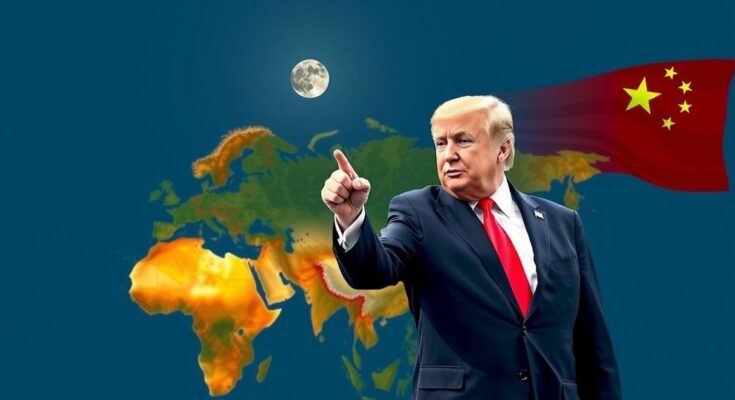With the potential return of Donald Trump to the presidency, China is seizing the opportunity to enhance its position as a global climate leader, as evidenced by its recent activities at COP29. Despite pressure to redefine its status as a donor, China continues to assert its role while revealing significant financial contributions to climate initiatives. Observers caution that U.S.-China relations may worsen under Trump’s administration, affecting future climate negotiations.
As former President Donald Trump is expected to return to power, China, the world’s largest greenhouse gas emitter and a leader in green energy, is seizing the opportunity to position itself as the global authority on climate change. During the COP29 climate negotiations in Baku, China showcased its commitment to international climate finance while resisting Western pressures for donor status, which would require increased accountability. In contrast to last year’s COP28, where the two nations collaborated on transitioning away from fossil fuels, the renewed tensions between the U.S. and China after Trump’s anticipated return may hinder such cooperation. The anticipated climate diplomacy shift is highlighted by comments from analysts noting that Trump’s presidency may allow China to frame itself as the more responsible global power. Belinda Schaepe, a researcher on Chinese energy policy, stated, “Trump’s election opens up an opportunity for China to step up into even more of a climate leadership role.” However, for China to solidify its leadership narrative, it will need to commit to more ambitious climate targets and aid commitments. In the ongoing discussions, China maintains its resistance to being labeled a donor country, despite revealing it had contributed $24.5 billion to climate finance since 2016. This financial disclosure is seen as a step forward, yet it raises the expectation for more transparency, particularly from Western negotiators like Germany’s Jennifer Morgan, who emphasized the need for accountability in reported contributions. China’s climate agenda is influenced by its own environmental crises and its rapidly expanding clean energy sectors, which dominate electric vehicle and solar markets, placing the Asian nation ahead of the U.S. and European competitors. Observers note that the political landscape is likely to worsen, particularly in U.S.-China relations, as tensions increase with Trump’s return. However, some experts assert that his administration could inadvertently simplify negotiations, considering the starkly different climate positions held by the U.S. and its allies.
The article discusses the shift in global climate leadership amidst the political landscape following Donald Trump’s anticipated return to the presidency. China’s role as a major emitter and its push for leadership in climate diplomacy is juxtaposed against the backdrop of the COP29 climate negotiations. The significance of international climate finance, particularly in the context of China’s emerging status on the global stage and ongoing tensions with Western nations, is crucial in understanding the dynamics of contemporary climate policy.
In conclusion, the return of Donald Trump to the presidency presents both challenges and opportunities for China in the realm of climate leadership. Through strategic moves at COP29, China aims to solidify its image as a responsible global player while responding to domestic and international pressures. Despite its reluctance to be classified as a donor nation, China’s initiatives in climate finance highlight its growing influence and commitment to addressing global environmental issues, albeit within a complicated geopolitical landscape.
Original Source: www.france24.com




